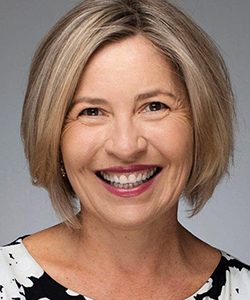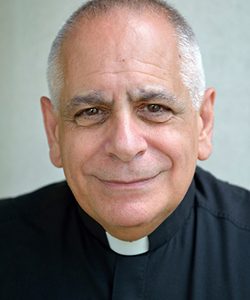Keeping Our Obligation of Service Front and Center
Dr. Anne T. Gallagher
President

In this time of unprecedented collective emergency, it has been too easy for us to put aside the fate of those who are living out the pandemic in a foreign land, often in situations of unimaginable hardship. Millions of migrant workers across the world have found themselves trapped with no way to return home safely. From Myanmar to Mozambique, from Venezuela to Nigeria, entire communities have been forced to flee violence, conflict, and severe economic distress.
Safety, when it can be found, often comes at a heavy price. At a rate unprecedented in our times, refugees are being increasingly condemned to a lifetime in camps that were only ever supposed to be a stopping point on their journey towards freedom from fear and persecution. This situation is only being made worse by draconian restrictions on mobility and widespread border closures that may well continue even after the health risks associated with COVID-19 are lessened.
And the unequal rollout of the vaccine at a time when the burden of disease and death is falling heavily on poorer countries does not bode well for migrants and refugees. According to the UN Refugee Agency, UNHCR, out of 157 countries currently developing national COVID-19 vaccination plans, 124 (79%) have committed to include refugees and 31 (20%) are already doing so, including Jordan, which hosts one of the largest refugee populations in the world relative to its national population. This is a good start, but it is not enough. Governments and the international community must do all they can to protect those who are so vulnerable.
Out of 157 countries currently developing national COVID-19 vaccination plans, 124 have committed to include refugees and 31 are already doing so. This is a good start, but it is not enough. Governments and the international community must do all they can to protect those who are so vulnerable.
The International Catholic Migration Commission has experienced a difficult year. Our own operating capacity has been constrained in myriad ways at a time when funding cuts for the critical humanitarian work of refugee resettlement and support to migrants and refugees are becoming deeper and more common. Despite these limitations, solid progress has been made over the course of the year in reshaping ICMC to ensure its long-term prosperity. In that regard I must express my deep appreciation to fellow members of its Governing Committee who have worked unsparingly with General Secretariat colleagues to build a strong and sustainable future for ICMC.
In working to address the many challenges that lie ahead, we must resolve to keep front and center our core obligation to serve the world’s migrants and refugees. As the Holy Father reminds us: “This is not a time for forgetfulness. The crisis we are facing should not make us forget the many other crises that bring suffering to so many people.”
Fulfilling Our Mission in 2020, A Year Like No Other
Msgr. Robert J. Vitillo
Secretary General

At the beginning of 2020, we at the International Catholic Migration Commission were intent on the goals we had set for the year and hoped that our efforts would be effective in serving those forced to leave their homes in search of freedom from persecution, safety from war and conflict, or decent work to overcome abject poverty or the threat of human trafficking. Little did we — as everybody else — know that our hopes and dreams, together with those of the people we serve, would be sorely threatened by a pandemic that stopped many daily activities previously considered routine throughout the world.
Despite the serious risks posed by COVID-19, ICMC greatly benefitted during 2020 from the grace of God, as it was able to count on the determination of our staff and volunteers, the support of our national member Episcopal Conferences, partner Catholic-inspired organizations, and other faith-based and civil society groups, as well as the loyal and sensitive accompaniment of our institutional and private donors, the wise counsel of our Governing Committee, and, most of all, the resilience and strength of the migrants and refugees themselves. Thus, as this report shows, ICMC succeeded in maintaining its services to assure safety and protection for migrants and refugees, as well as its advocacy for just policies that open new futures to uprooted people in all parts of the world.
Creativity and flexibility were the key operative words as we adapted to travel restrictions, lockdowns, and other challenges to directly accompanying people on the move or meeting government officials and policymakers. We prioritized the safety of our beneficiaries and staff by purchasing personal protective equipment and adapting workspaces to allow for social distancing. When public health authorities restricted our in-person contact with people served by our programs, we shifted to interviewing, counselling, and informing them remotely. At headquarters, most staff worked from home, while a few assured a daily presence to respond to emergencies in the field.
Creativity and flexibility were the key operative words as we adapted to travel restrictions, lockdowns, and other challenges to directly accompanying people on the move or meeting government officials and policymakers. We prioritized the safety of our beneficiaries and staff.
Amid these challenges, we continued a year-long strategic review of the organization to assure its future sustainability, quality, and effectiveness in a time when many non-governmental organizations are experiencing financial challenges.
In 2020, ICMC experienced the vulnerability and frailty that is the daily reality of migrants and refugees and truly learned the lesson so boldly and wisely preached by Pope Francis: “Like the disciples in the Gospel we were caught off guard by an unexpected, turbulent storm. We have realized that we are on the same boat, all of us fragile and disoriented, but at the same time important and needed, all of us called to row together, each of us in need of comforting the other.”
[Cover photo: A Rohingya refugee boy at an ICMC-supported informal learning center in Malaysia. As refugees are not allowed to attend formal education, community-led initiatives provide children and adults with skills to be self-sufficient. © Viola Berlanda/ICMC.]

